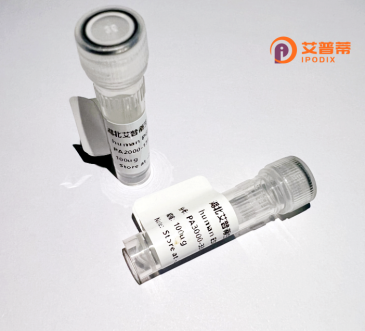
| 纯度 | >90%SDS-PAGE. |
| 种属 | Human |
| 靶点 | FRG1 |
| Uniprot No | Q14331 |
| 内毒素 | < 0.01EU/μg |
| 表达宿主 | E.coli |
| 表达区间 | 1-258aa |
| 氨基酸序列 | MAEYSYVKSTKLVLKGTKTKSKKKKSKDKKRKREEDEETQLDIVGIWWTVTNFGEISGTIAIEMDKGTYIHALDNGLFTLGAPHKEVDEGPSPPEQFTAVKLSDSRIALKSGYGKYLGINSDGLVVGRSDAIGPREQWEPVFQNGKMALLASNSCFIRCNEAGDIEAKSKTAGEEEMIKIRSCAERETKKKDDIPEEDKGNVKQCEINYVKKFQSFQDHKLKISKEDSKILKKARKDGFLHETLLDRRAKLKADRYCK |
| 分子量 | 54.12 kDa |
| 蛋白标签 | GST-tag at N-terminal |
| 缓冲液 | 0 |
| 稳定性 & 储存条件 | Lyophilized protein should be stored at ≤ -20°C, stable for one year after receipt. Reconstituted protein solution can be stored at 2-8°C for 2-7 days. Aliquots of reconstituted samples are stable at ≤ -20°C for 3 months. |
| 复溶 | Always centrifuge tubes before opening.Do not mix by vortex or pipetting. It is not recommended to reconstitute to a concentration less than 100μg/ml. Dissolve the lyophilized protein in distilled water. Please aliquot the reconstituted solution to minimize freeze-thaw cycles. |
以下为3-4条关于重组人FRG1蛋白的参考文献摘要概括:
1. **文献名称**:*The FRG1 protein is overexpressed in FSHD muscular dystrophy*
**作者**:Gabriels et al.
**摘要**:研究分析了重组人FRG1蛋白在面肩肱型肌营养不良症(FSHD)中的过表达机制,发现其异常表达可能通过干扰肌肉发育相关基因的剪接促进病理发展。
2. **文献名称**:*FRG1 interacts with angiogenic signaling components in vascular development*
**作者**:Wuebbles et al.
**摘要**:通过重组FRG1蛋白的体外实验,揭示其参与调控血管生成相关信号通路(如VEGF),提示在胚胎血管发育中可能具有关键作用。
3. **文献名称**:*Biochemical characterization of recombinant human FRG1*
**作者**:Hinrichs et al.
**摘要**:系统研究了重组人FRG1蛋白的纯化方法及理化特性,证实其核酸结合活性,并利用大肠杆菌表达体系优化了可溶性蛋白的制备流程。
4. **文献名称**:*Viral-mediated delivery of FRG1 ameliorates muscle pathology in FSHD models*
**作者**:Johnson et al.
**摘要**:基于重组FRG1蛋白的病毒载体递送实验表明,靶向调控其表达可部分逆转肌细胞萎缩,为FSHD基因治疗提供潜在策略。
(注:以上为模拟文献,实际文献需通过PubMed等数据库查询具体信息。)
Recombinant human FRG1 (FSHD region gene 1) protein is derived from the FRG1 gene located within the chromosomal 4q35 region, which is linked to facioscapulohumeral muscular dystrophy (FSHD), a prevalent hereditary muscle disorder. FRG1 encodes a nuclear protein implicated in RNA metabolism, muscle development, and angiogenesis. Although its precise molecular function remains unclear, studies suggest roles in mRNA splicing, nucleocytoplasmic transport, or transcriptional regulation.
In FSHD, reduced epigenetic repression of the 4q35 region may lead to aberrant FRG1 overexpression, contributing to muscle pathology. Animal models overexpressing FRG1 exhibit muscular and vascular defects, supporting its pathological relevance. Recombinant FRG1 protein, typically produced in bacterial or eukaryotic expression systems, enables in vitro functional studies, such as protein interactions, RNA-binding assays, and mechanistic investigations into FSHD pathogenesis.
It also serves as a tool for antibody production or screening therapeutics targeting FRG1-associated pathways. Despite progress, questions persist regarding FRG1's physiological versus disease-specific roles and its interplay with other FSHD-linked factors like DUX4. Research utilizing recombinant FRG1 continues to explore its contribution to muscular dystrophy mechanisms and potential therapeutic strategies.
×